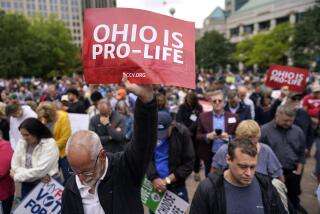Massachusetts Governor May Challenge Gay Marriage
- Share via
BOSTON — Gov. Mitt Romney said Friday that he might turn to the courts in his fight to keep Massachusetts from issuing same-sex marriage licenses starting in May.
That is when an order from the state’s highest court takes effect, making Massachusetts the first state to legalize marriage for gay and lesbian couples. State legislators have twice voted to pass an amendment that would ban same-sex marriage, but the measure requires additional approval before it becomes law.
Romney also has discussed taking some form of executive action to block town clerks from issuing marriage licenses to gay and lesbian couples beginning May 17. It was not clear whether such action would be enforceable.
“I would consider, after the Legislature has completed its work, what legal options are available to me, if any,” said the Republican governor, who repeatedly has stated his belief that marriage should be limited to a union between a man and a woman.
At a brief statehouse news conference Friday, Romney would not expand on possible legal strategies. But the governor has made no secret of his distaste for the 4-3 ruling in November by the Supreme Judicial Court that made Massachusetts the first state to legalize gay and lesbian marriage -- and in the process launched a national debate.
The state’s highest court gave the Legislature six months to implement its decision, setting in motion a frantic effort by lawmakers to craft an acceptable alternative to marriage for gay and lesbian couples.
Even while applauding state legislators for working until nearly midnight Thursday as they tried to hammer out a constitutional amendment dealing with same-sex marriage, Romney criticized the court again for “setting aside thousands of years of recorded history and legal precedent.”
State senators and representatives gathered jointly Thursday for a session known as a constitutional convention. After 10 hours of impassioned speeches and tense backroom negotiations, legislators voted 121 to 77 in favor of an amendment that would limit marriage to a union between a man and a woman but establish civil unions for same-sex couples.
At a similar constitutional convention four weeks earlier, legislators gave preliminary approval to the same measure, drafted by the leadership of both parties in both houses. But under the complex rules of the Massachusetts constitution, an amendment must pass three “readings,” or votes, before being finalized.
The proposed amendment then must be considered in the next legislative session. If the bill again survives three readings, it is offered to the general electorate as a ballot initiative. The earliest possible date that an amendment banning same-sex marriage could reach voters is November 2006.
The constitutional convention will reconvene March 29. But dozens of modifications could be added to the amendment by then, making the already cumbersome approval process even more difficult.
At least 20 legislators stepped forward following Thursday night’s vote to submit possible changes to the amendment, said Charles Rasmussen, chief of staff to House Speaker Thomas M. Finneran.
But Rasmussen said that Finneran -- one of the primary authors of the amendment approved Thursday -- remained “guardedly optimistic” that the measure could garner the 101 votes needed for passage at the upcoming constitutional convention.
Along with state Senate President Robert Travaligni -- also an author of the proposed amendment -- Finneran is considered one of the Legislature’s leading power brokers. Both men are Democrats who worked with Republican leaders in the state House and Senate to sponsor an amendment that would preserve marriage as a heterosexual institution, but extend many marriage benefits to same-sex couples.
But some lawmakers Thursday said they opposed any attempt to amend the constitution for any reason. Others wanted to block an amendment so the Supreme Judicial Court decision could take effect with no interference in May.
Sen. Jarrett Barrios, a Democrat from Cambridge, argued Thursday that the proposed amendment discriminates against gays and lesbians by establishing civil unions as an institution separate from marriage. Barrios is the Senate’s only openly gay member.
“We remain opposed to writing discrimination into our state’s constitution,” he said.
Some foes of same-sex marriage also were not happy that civil unions were included.
“Adding civil unions to the mix is like the U.S. mint cranking out bogus bills while printing real money,” said Robert Knight, who heads the culture and family institute of Concerned Women for America in Washington, a nonprofit that promotes traditional values and biblical principals.
“They’re playing with fire if they think they can get away with creating marriage by any other name.”
More to Read
Sign up for Essential California
The most important California stories and recommendations in your inbox every morning.
You may occasionally receive promotional content from the Los Angeles Times.










